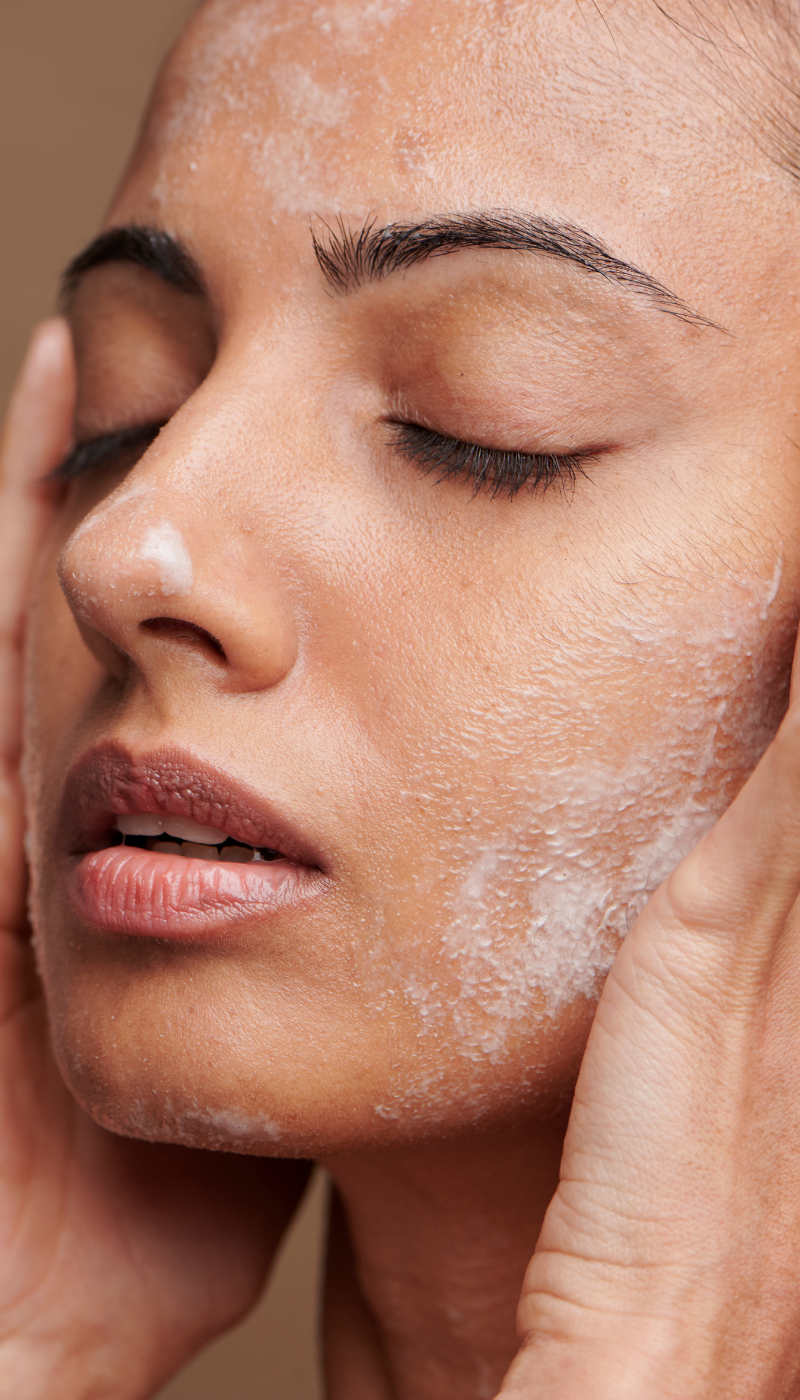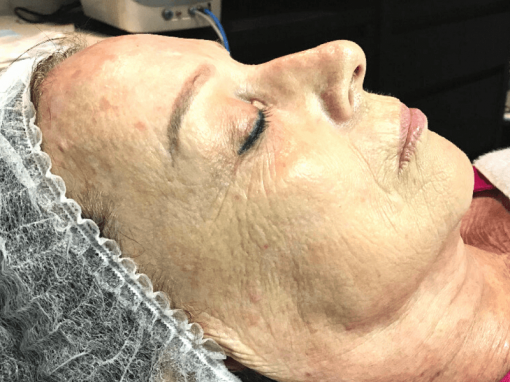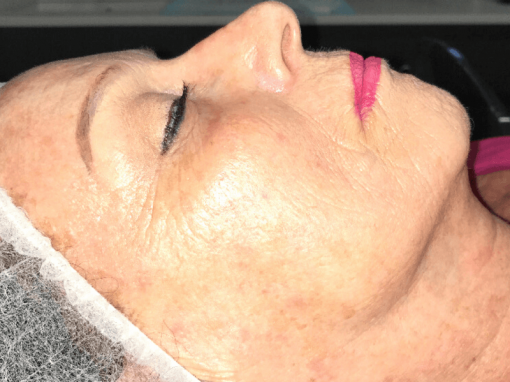Clinical Peels Gold Coast, Brisbane and Ipswich

Skin Rejuvenation
Chemical Peels
Clinical peels are clinical strength, results-oriented treatments designed to address specific aesthetic concerns. Clinical peels can also improve skin barrier function.
The goal of any peel is to remove the skin’s outer layer of dead cells. When performed by one of our experienced Esteem Clinic dermal therapists, a course of peels alongside a prescribed home-care regime can be highly effective at treating a multitude of skin conditions. At Esteem Clinic, we offer seven different clinical peels so that you can choose the one that is right for you.
Our team of skilled dermal clinicians understands the unique skin concerns and aesthetic aspirations of our clients. Prior to any treatment, we offer a complimentary consultation to provide an opportunity for you to openly discuss your concerns, assess the suitability of the treatment, and establish your desired aesthetic goals. This consultation ensures that we tailor our approach to address your specific needs and deliver the best possible outcomes.

In the Spotlight
Our seven chemical peels:
- Gentle Pomegranate Peel
- Dermaceutic Mask Peel
- Milk Peel
- Mela Peel Forte (2 Peels)
- Mela Peel Forte (2 Peel) & Prep Kit
- Dermaceutic Cosmo Peel (12%)
- Dermaceutic Cosmo Peel Forte (40%)
Clinical peels can vary in intensity, from very superficial to deep epidermal exfoliation. Your specific skin concerns, along with your dermal clinicians’ assessment, will help establish the most effective solution for you.
Clinical peels are used to treat the face, neck and décolletage.
Concerns that chemical peels can address
We offer clients a full range of clinical peels to address the following concerns:
- Acne
- Acne scarring
- Oily skin
- Blackheads
- Enlarged pores
- Dehydrated and dull skin
- Fine lines and wrinkles
- Uneven tone or texture
- Pigmentation
What to expect during your treatment
A clinical peel will take approximately 20 to 30 minutes to perform. One of our dermal clinicians will cleanse the area to be treated and then prepare the skin for the peel by applying a solution to clean away any oil on the skin. Removing excess oil ensures an even and deep penetration of the peel itself. Your dermal clinician will then apply the correct peel to meet your skin’s requirements and leave the peel on the skin for the appropriate amount of time. Serums will be applied to the skin after the peel has been removed, to soothe any heat or redness from the skin.
Finally, your dermal clinician will apply sunscreen to protect the skin from UV damage when you leave the clinic.
Most clients will feel tingling, warmth or prickling from a clinical peel, depending on the type of peel used and how long it is left on the skin. Ultimately, peels will feel different from person to person.
Your consultation for clinical peels
The primary goal of the consultation is to thoroughly explain the chemical peel treatment of your choice, allowing you to fully understand what it entails. We will assess your suitability for the treatment, taking into account factors such as your skin type, condition, and any specific concerns you may have.
The consultation also aims to personalise the treatment steps to meet your specific needs and desired results. By understanding your expectations and aesthetic goals, we can tailor the treatment plan accordingly. We will also discuss the preparation steps you need to take before the procedure and provide comprehensive aftercare instructions to ensure optimal healing and results.
We will also outline the potential risks and complications associated with chemical peels. This ensures that you are fully informed about the possible outcomes and can make an educated decision about proceeding with the treatment. We can provide an estimation of the total treatment costs after outlining your personal treatment plan.
Your pre-treatment consultation is complimentary, which allows you to take your time to consider the information provided and make an informed decision about whether or not to proceed with the chemical peel at the clinic.
Costs of clinical peels in Gold Coast, Brisbane and Ipswich
The costs of chemical peel treatments can vary from patient to patient, as it will depend on the details of the treatment.
We will calculate the costs of your personalised treatment during your consultation, as we will need to determine the right peel for you and adjust the steps to suit your needs.
Your costs will ultimately depend on what concerns you want to treat, the severity of your concerns, the type of peel needed, treatment time and the specific treatment area/s. Your consultation is complimentary, so you will be able to decide if you are happy to undergo the treatment after receiving all of the necessary information.
For more information on costs, please contact our team or schedule your consultation at your preferred location.
Post Treatment Care
AFTER TREATMENT
After your treatment, there are important guidelines to follow in order to maximise your results and support the healing process.
To enhance your results, make use of the antioxidants, hydrating, and peptide serums as prescribed by your technician. These serums can contribute to optimal outcomes.
For three to five days following the treatment, it is advisable to avoid using advanced AHA, Retin A, and exfoliation products (mechanical/physical or enzymatic). This precaution helps prevent potential skin irritation or sensitivity during the recovery phase.
To protect your skin and maintain the achieved results, it is crucial to use a daily sunscreen with a minimum SPF of 50+ post-treatment. This shields your skin from harmful UV rays and supports long-term skin health.
Direct sun exposure should be avoided for at least one week after the treatment. Sunlight can have negative effects on the healing process and may diminish the effectiveness of the procedure.
For the first 24 hours following the treatment, it is recommended to steer clear of heat-generating activities such as exercise, hot showers, saunas, and swimming. These activities can increase blood flow to the treated area and potentially interfere with the healing process.
Facial waxing and hair removal procedures should be avoided for a period of 14 days after the treatment. This allows the skin to recover and minimises the risk of irritation or complications.
Using mineral makeup is encouraged after the treatment. Mineral makeup is generally gentle on the skin and can help provide coverage while allowing the skin to breathe and heal.
By following these guidelines, you can promote optimal healing and maintain the desired results of your treatment.
Risks and Complications
The risks of chemical peels can vary depending on the type and strength of the chemical peel used. When performed by a qualified practitioner, the risks can be minimised.
After a chemical peel, it is normal to experience temporary skin irritation, redness, and discomfort. Peeling and flaking of the skin are common as the outer layers are removed. The extent and duration of peeling depend on the depth of the peel, and following post-treatment care instructions is important for healing.
There is a risk of temporary or permanent changes in skin pigmentation, especially for individuals with darker skin tones. Proper evaluation and selection of the appropriate peel for your skin type can help minimise this risk. Hyperpigmentation, resulting in lighter patches of skin, is a rare possibility.
Infection is a rare risk, but it is important to keep the treated area clean and follow post-treatment care instructions to minimise this possibility. Scarring is uncommon but can occur if the procedure is not performed correctly or if proper aftercare instructions are not followed.
Following a chemical peel, your skin may be more sensitive to sunlight, so using sunscreen and avoiding excessive sun exposure is crucial. Allergic reactions to the chemical peel solution or other products used during the procedure are possible, so informing your practitioner about any known allergies is important.
Clinical Peels Before & Afters


Clinical Peels
FAQs
What can I expect from my results?
In the days following a medium-depth peel treatment, you may experience some skin flaking or dryness before the skin settles and shows improvements. With either regular superficial or medium-depth peels, it is normal (but not always the case) to experience some breakouts post-peel because of the resurfacing nature of this treatment.
Regular treatments are recommended to ensure continuous improvements and maximum benefit from at-home skincare products (ability to absorb and have an effect).
Who is not suitable for chemical peels?
- Is pregnant or breastfeeding can only have the following peel treatments (Gentle Pomegranate Peel)
- Is prone to cold sores – MUST take antiviral medication two to three days prior to treatment
- Has had recent sun or solarium exposure
- Who has recently had other treatments to the area (such as injectables, microdermabrasion, laser, waxing, electrolysis and depilatory cream)
- Is on certain medications
- Has impaired skin barrier function
Your Esteem Clinic therapist will confirm your suitability during the consultation process.
Awards and Recognition
Esteem has been awarded Best Aesthetic Practice Queensland for three consecutive years, by the prestigious “My Face My Body Awards”. In 2018, Esteem was extremely proud to have been recognised as the Best Aesthetic Practice in Australia. Esteem was also honoured to have been entered into the “My Face My Body” Hall of Fame in 2018. These prestigious industry awards are testiment to the group’s ongoing commitment to delivering advanced aesthetic techniques and the latest in anti-ageing technology.
